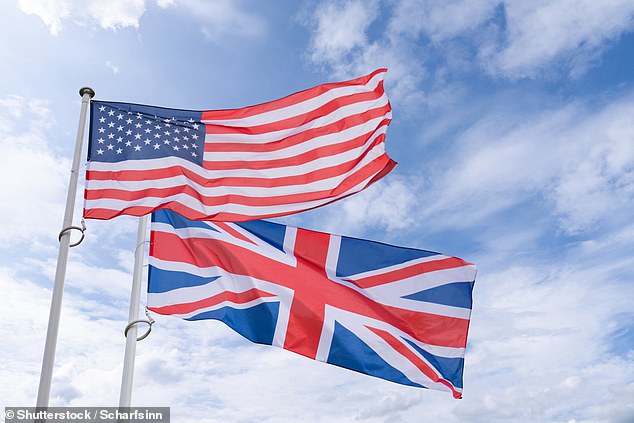Britons and Americans may both speak English, but it’s safe to say that our languages are very different.
While people in the UK might go on holiday, wear a pair of trousers, or walk on the pavement, people across the pond would go on vacation, wear a pair of pants, or walk on the sidewalk.
But these two worlds are colliding, according to a new study.
Researchers from Northern Arizona University and Babbel have found that several ‘Britishisms’ are now being regularly used by Americans.
In their study, the team analysed an enormous database of words used by Americans.
Their analysis revealed the ‘bonkers’ is the most widely used Britishism, with Americans using the term to describe everything from chaotic sports moments to political scandals and viral trends.
‘It’s no coincidence that “bonkers” has become the standout winner among Britishisms in the US,’ said Esteban Touma, a linguistic expert at Babbel, which commissioned the research.
‘This term, with its whimsical edge, perfectly aligns with how Gen Z communicates – capturing the absurdity and excitement of modern life.’

Britons and Americans may both speak English, but it’s safe to say that our languages are very different
In the study, the researchers set out to understand the exchange of words between the US and the UK.
‘Whilst slang on either side of the Atlantic evolves distinctly, the exchange of words is very much a two-way street,’ Mr Touma said.
Babbel analysed a database containing 5 million transcribed words and 1,000 hours of spoken American English, collected between January 2023 and October 2024.
‘Bonkers’ – meaning absurd or wildly extreme – topped the list, accounting for 24 per cent of all Britishisms identified.
This word proved particularly popular among Gen Z and women – with a whopping 90 per cent of those who used the term being female.
‘Bonkers’ was followed by ‘amongst’ (14 per cent), ‘queue’ (13 per cent), ‘wonky’ (11 per cent), and ‘cheeky’ (10 per cent).
Americans also enjoyed using ‘snarky’ (10 per cent), ‘cheers’ (six per cent), ‘keen’ (five per cent), ‘maths’ (three per cent), and ‘nil’ (two per cent).
Meanwhile, several other Britishisms were also on the up – including ‘nutter’, ‘trousers’, ‘b**ger’, ‘dodgy’, ‘kerfuffle’, ‘posh’, ‘aggro’, ‘banter’, ‘bo****ks’, and ‘flummox’.

According to Mr Touma, the prevalence of Britishisms in the US is a reflection of ‘cultural globalisation’

‘British TV shows like Love Island and global music icons like Charli XCX are doing more than entertaining: they’re exporting language and fuelling cultural exchange,’ Mr Touma said
According to Mr Touma, the prevalence of Britishisms in the US is a reflection of ‘cultural globalisation’.
‘British TV shows like Love Island and global music icons like Charli XCX are doing more than entertaining: they’re exporting language and fuelling cultural exchange,’ he said.
‘Streaming giants like Netflix and Apple TV have further amplified this phenomenon, bringing British shows (like the recent smash-hit Adolescence) into American dorms and homes.
‘Meanwhile, viral internet trends and British celebrities have turned British phrases into digital currency, signalling membership in a shared global community.
‘In fact, the rise of Britishisms could herald a new British invasion of the kind experienced in the Punk and Britpop eras.
‘It’s not just about adopting new words – it’s about embracing a shared culture.
‘As British culture continues to resonate globally, terms like “bonkers” are cementing their place as markers of a cultural and linguistic evolution without boundaries.’
This article was originally published by a www.dailymail.co.uk . Read the Original article here. .


